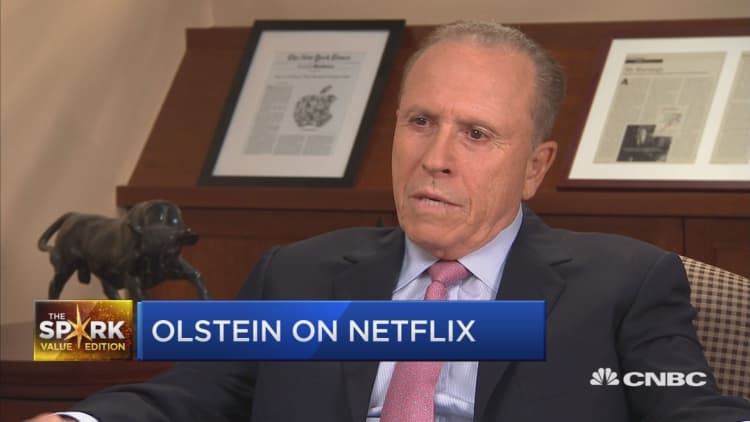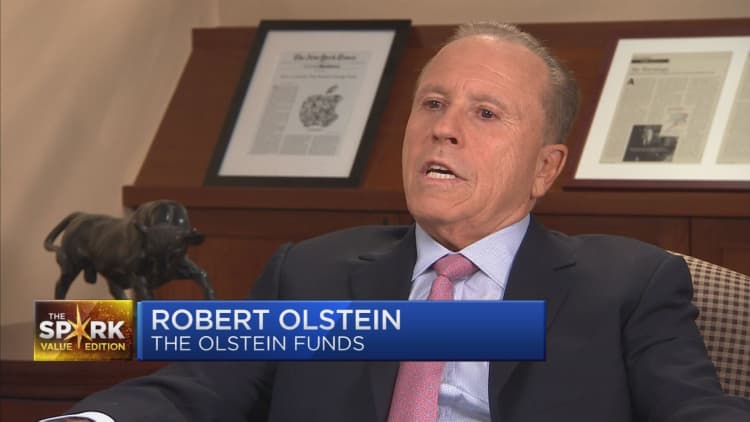
Don't get Bob Olstein started on Netflix. Or Cisco. Or Tesla.
When it comes to investing, the veteran fund manager said there are three key things he looks at:
"Price, price and price."
That's why he prefers Walt Disney — which he says still has 30 percent of upside — to Netflix., which is currently trading north of 300 times estimated 2016 earnings.
(To watch Kelly's full, in-depth interview with Bob Olstein, click here.)
As for any problems with Disney's juggernaut ESPN, he argues its slow growth is already priced in, and that he'll trade growth for strong free cash flow — another of his musts — any day.
Tesla Motors? "Elon Musk is probably one of the brightest human beings in the history of mankind," Olstein said. But, "free cash flow is our mantra."
Olstein, whose Purchase, New York-based Olstein Funds oversees a number of mutual funds, such as the all-cap value fund he launched in 1995, shared his views in the latest CNBC PRO "Value Spark" interview.
Never one to keep quiet about injustices he perceives, Olstein also inveighed against market forecasters, passive investing, exchange-traded funds, earnings manipulation, heavy stock-based compensation and what he calls the Wall Street "spin machine."
Take Cisco Systems, "I'm supposed to trust Wall Street research that in a nine-month period changed its value of Cisco" by $50 billion — twice, he admonished.
"We like to sit out here, rip balance sheets and income statements apart, make investment decisions rather than market decisions," he said.
Indeed, that is why Olstein vehemently defends the cost of his mutual funds (his all-cap fund has a "high" fee, according to Morningstar, with a 2.26 percent expense ratio).
"Do you believe that if you're sick you should go to the cheapest doctor? We spend our fees on doing research," and picking good stocks to invest in, he said.
And funds like his are better and even safer for many retail investors than newer, cheaper exchange-traded funds, he argued.
"In ETFs, we've had two little mini crashes already," he said. On top of that, "anybody who tries to trade our fund ... always sells us at bottoms, and buys us at tops."

The only advantage of an ETF over a mutual fund, Olstein said, is "for trading." His all-cap fund, he added, has turned a $10,000 investment in 1995 into $68,000 after fees today.
As for the poor performance lately of many actively managed funds, particularly hedge funds, he said "it's probably true that only 15 percent to 20 percent" of the professionals are above average.
He is equally upset by market professionals who make calls or predictions on where the market is headed, adding "I don't care whether it's Bill Gross ... or [Jeffrey] Gundlach ... or Stanley Druckenmiller."
While many of them have been successful traders or even have made prescient calls on the market in the past, he said, the idea that the market can be consistently forecast is as plausible as discovering a fountain of youth.
Getting back to his current stock picks, Olstein actually likes Cisco today, along with Legg Mason, Oracle, Zimmer Biomet Holdings, Keysight Technologies and retailers like Kohl's, Macy's and Bed Bath & Beyond.
Isn't Bed Bath an example of "dying" old-school retail? Not to Olstein, who emphasizes that he sees the company generating $6 per share in free cash flow in the next couple years, and that the shares are worth more like $70 versus the $40 they trade for today.
He is staying away from the big banks, though. "We got burned by derivatives in 2008," he said. "I don't understand them, I don't want to understand them." So, he is avoiding the big banks "only because of the derivative exposure."
On the markets overall, Olstein added a final warning.
The benchmark "was much more conservative 20 years ago," he said. Today, it has prominent members like Netflix, Amazon.com and Facebook — "growthy" companies trading at high multiples in new fields like social networking.
"I don't think the market's a bubble," he said, "it's just a different mentality."


